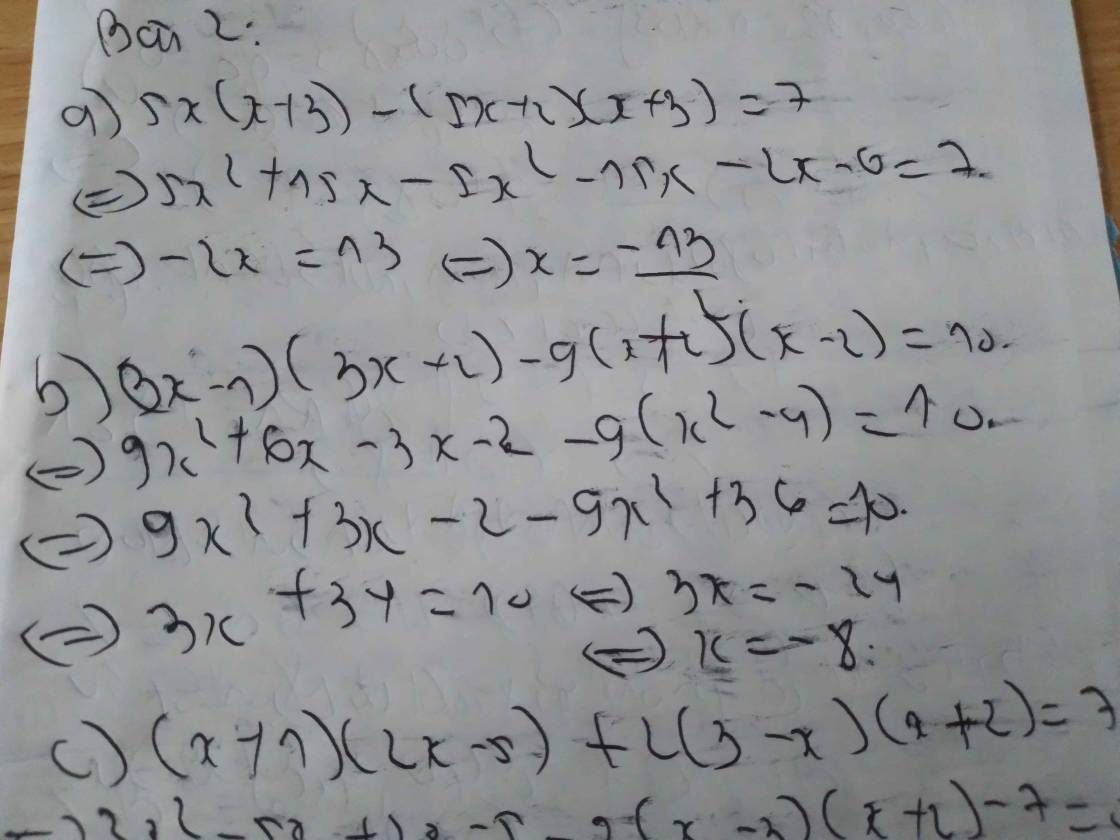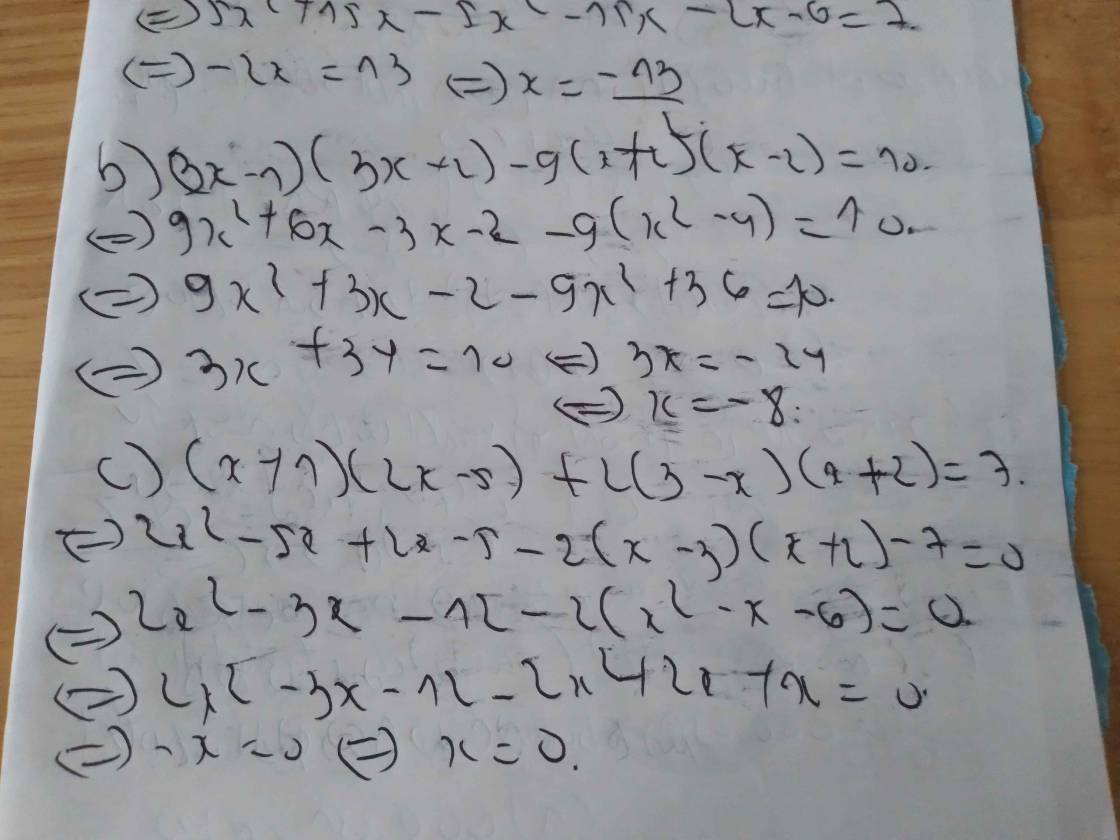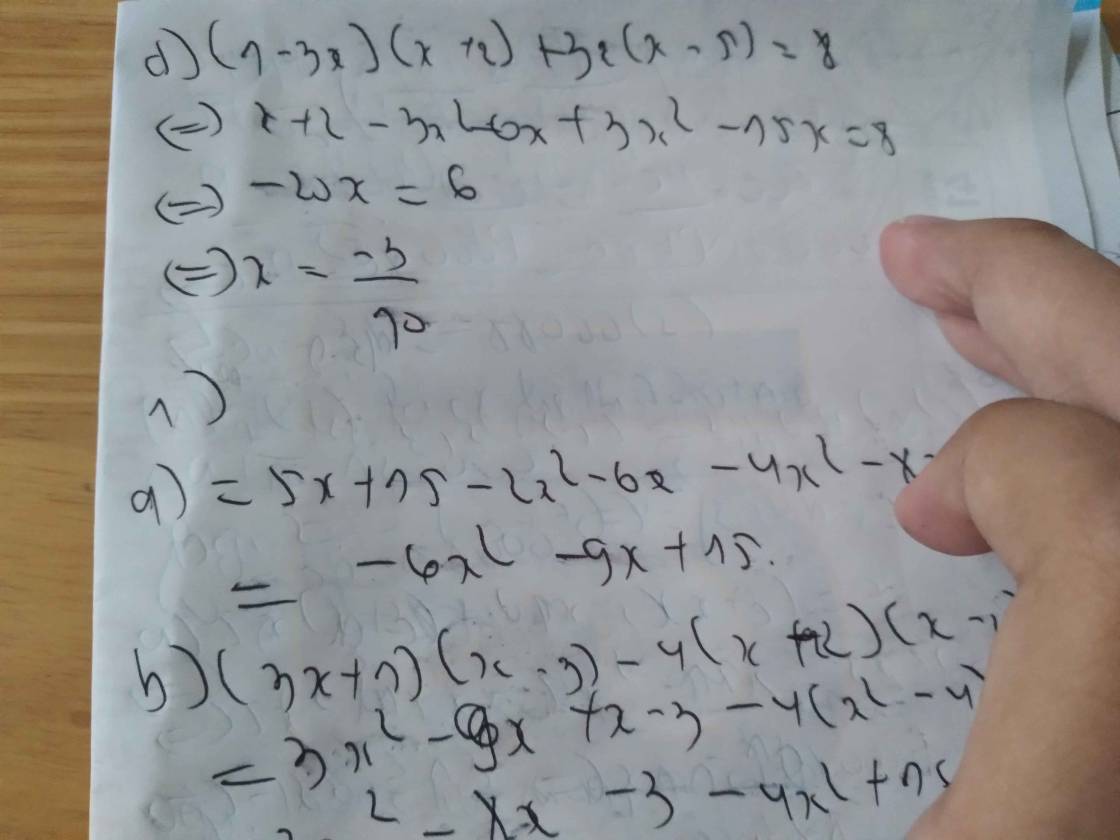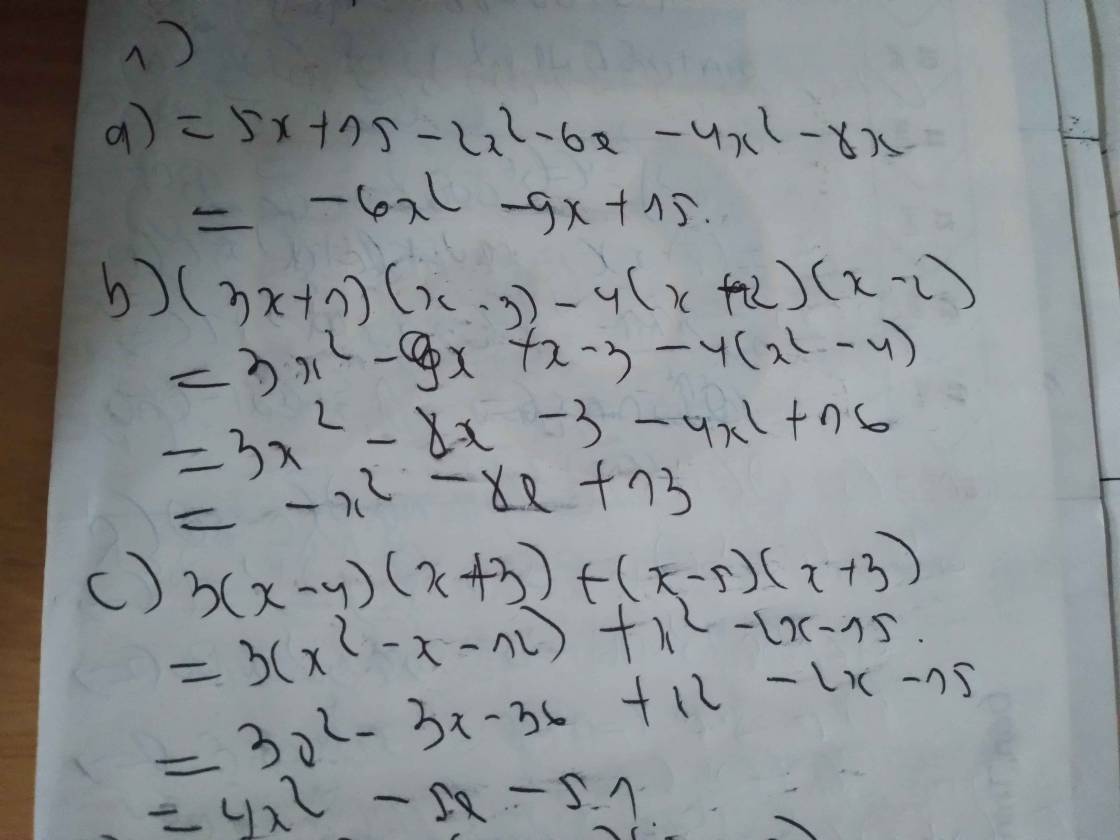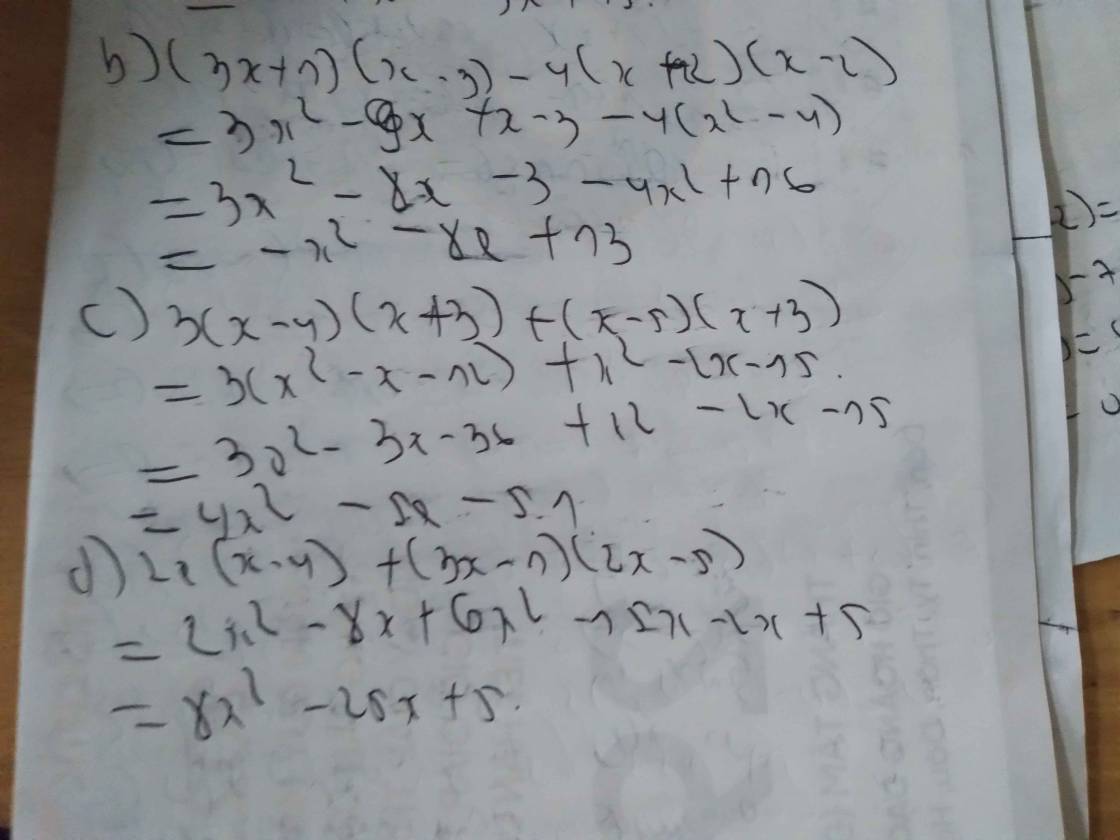tìm x
(3x\(^2\)-x+1).(x-1)+x\(^2\)(4-3x)=\(\frac{5}{2}\)
2x\(^2\)+3(x-1).(x+1)=5x(x+1)

Những câu hỏi liên quan
Bài 1:Thực hiện phép tính
a,(5-2x)(x+3)-4x(x+2) b,(3x+1)(x-3)-4(x+2)(x-2)
c,3(x-4)(x+3)+(x-5)(x+3) d,2x(x-4)+(3x-1)(2x-5)
Bài 2:Tìm x biết
a,5x(x+3)-(5x+2)(x+3)=7
b,(3x-1)(3x+2)-9(x+2)(x-2)=10
c,(x+1)(2x-5)+2(3-x)(x+2)=7
d,(1-3x)(x+2)+3x(x-5)=8
Tìm x :( bài 14 trang 11 sách bồi dưỡng năng lực tự học toán 8)Câu 2 : (2x+3)2+(x-1)*(x+1)5*(x+2)2-(x-5)*(x+1)+(x+4)2Câu 3 : (-x+5)*(x-2)+(x-7)*(x+7)(3x+1)2-(C)*(3x+2)Câu 4 : (5x-1)*(x+1)-2(x-3)2(x+2)*(3x-1)-(x+4)2+(x2-x)Câu 5 : (4x-1)2-(3x+2)*(3x-2)(7x-1)*(x+2)+(2x+1)2-(3x+2)Câu 6 : (2x+3)2-(5x-4)*(5x+4)(x+5)2-(3x-1)*(7x+2)-(x2-1+1)Câu 7 : (1-3x)2-(x-2)*(9x+1)(3x-4)*(3x+4)-9(x+3)2Câu 8 : (3x+4)*(3x-4)-(2x+5)(x-5)+(2x+1)2-(x2-2x)+(x-1)2Câu 9 : (x-7)*(x+1)-(x-3)2(3x-5)*(3x+5)-(3x+1)+(x-2)2-x2Câu...
Đọc tiếp
Tìm x :( bài 14 trang 11 sách bồi dưỡng năng lực tự học toán 8)
Câu 2 : (2x+3)2+(x-1)*(x+1)=5*(x+2)2-(x-5)*(x+1)+(x+4)2
Câu 3 : (-x+5)*(x-2)+(x-7)*(x+7)=(3x+1)2-(C)*(3x+2)
Câu 4 : (5x-1)*(x+1)-2(x-3)2=(x+2)*(3x-1)-(x+4)2+(x2-x)
Câu 5 : (4x-1)2-(3x+2)*(3x-2)=(7x-1)*(x+2)+(2x+1)2-(3x+2)
Câu 6 : (2x+3)2-(5x-4)*(5x+4)=(x+5)2-(3x-1)*(7x+2)-(x2-1+1)
Câu 7 : (1-3x)2-(x-2)*(9x+1)=(3x-4)*(3x+4)-9(x+3)2
Câu 8 : (3x+4)*(3x-4)-(2x+5)=(x-5)+(2x+1)2-(x2-2x)+(x-1)2
Câu 9 : (x-7)*(x+1)-(x-3)2=(3x-5)*(3x+5)-(3x+1)+(x-2)2-x2
Câu 10 : -5(x+3)2+(x-1)*(x+1)+(2x-3)=(5x-2)2-5x(5x+3)
Rút gọn :
1. (2x-5)(3x+1)-(x-3)^2+(2x+5)^2-(3x+1)^3
2. (2x-1)(2x+1)-3x-2)(2x+3)-(x-1)^3+(2x+3)^3
3. (x-2)(x^2+2x+4)-(3x-2)^3+(3x-4)^2
4. (7x-1)(8x+2)-(2x-7)^2-(x-4)^3-(3x+1)^3
5. (5x-1)(5x+1)-(x+3)(x^2-3x+9)-(2x+4)^2-(3x-4)^2+(2x-5)^3
6. (4x-1)(x+2)-(2x+5)^2-(3x-7)^2+(2x+3)^3=(3x-1)^3
1: \(=6x^2+2x-15x-5-x^2+6x-9+4x^2+20x+25-27x^3-27x^2-9x-1\)
=-27x^3-18x^2+4x+10
2: =4x^2-1-6x^2-9x+4x+6-x^3+3x^2-3x+1+8x^3+36x^2+54x+27
=7x^3+37x^2+46x+33
5:
\(=25x^2-1-x^3-27-4x^2-16x-16-9x^2+24x-16+\left(2x-5\right)^3\)
\(=8x^3-60x^2+150-125+12x^2-x^3+8x-60\)
=7x^3-48x^2+8x-35
Đúng 0
Bình luận (0)
Bài 4: Tìm x, biết:
a) 3(2x – 3) + 2(2 – x) = –3 ; b) x(5 – 2x) + 2x(x – 1) = 13 ;
c) 5x(x – 1) – (x + 2)(5x – 7) = 6 ; d) 3x(2x + 3) – (2x + 5)(3x – 2) = 8 ;
e) 2(5x – 8) – 3(4x – 5) = 4(3x – 4) + 11; f) 2x(6x – 2x 2 ) + 3x 2 (x – 4) = 8.
\(a,3\left(2x-3\right)+2\left(2-x\right)=-3\\ \Leftrightarrow6x-9+4-2x=-3\\ \Leftrightarrow4x=2\\ \Leftrightarrow x=\dfrac{1}{2}\\ b,x\left(5-2x\right)+2x\left(x-1\right)=13\\ \Leftrightarrow5x-2x^2+2x^2-2x=13\\ \Leftrightarrow3x=13\\ \Leftrightarrow x=\dfrac{13}{3}\\ c,5x\left(x-1\right)-\left(x+2\right)\left(5x-7\right)=6\\ \Leftrightarrow5x^2-5x-5x^2-3x+14=6\\ \Leftrightarrow-8x=-8\\ \Leftrightarrow x=1\\ d,3x\left(2x+3\right)-\left(2x+5\right)\left(3x-2\right)=8\\ \Leftrightarrow6x^2+9x-6x^2-11x+10=8\\ \Leftrightarrow-2x=-2\\ \Leftrightarrow x=1\)
\(e,2\left(5x-8\right)-3\left(4x-5\right)=4\left(3x-4\right)+11\\ \Leftrightarrow10x-16-12x+15=12x-16+11\\ \Leftrightarrow-14x=-4\\ \Leftrightarrow x=\dfrac{2}{7}\\ f,2x\left(6x-2x^2\right)+3x^2\left(x-4\right)=8\\ \Leftrightarrow12x^2-4x^3+3x^3-12x^2=8\\ \Leftrightarrow-x^3-8=0\\ \Leftrightarrow-\left(x^3+8\right)=0\\ \Leftrightarrow-\left(x+2\right)\left(x^2-2x+4\right)=0\\ \Leftrightarrow\left[{}\begin{matrix}x=-2\\x\in\varnothing\left(x^2-2x+4=\left(x-1\right)^2+3>0\right)\end{matrix}\right.\)
Đúng 3
Bình luận (0)
Bài 4:
a: Ta có: \(3\left(2x-3\right)-2\left(x-2\right)=-3\)
\(\Leftrightarrow6x-9-2x+4=-3\)
\(\Leftrightarrow4x=2\)
hay \(x=\dfrac{1}{2}\)
b: Ta có: \(x\left(5-2x\right)+2x\left(x-1\right)=13\)
\(\Leftrightarrow5x-2x^2+2x^2-2x=13\)
\(\Leftrightarrow3x=13\)
hay \(x=\dfrac{13}{3}\)
c: Ta có: \(5x\left(x-1\right)-\left(x+2\right)\left(5x-7\right)=6\)
\(\Leftrightarrow5x^2-5x-5x^2+7x-10x+14=6\)
\(\Leftrightarrow-8x=-8\)
hay x=1
Đúng 0
Bình luận (0)
a/ \(3\left(2x-3\right)+2\left(2-x\right)=-3\)
\(\Leftrightarrow6x-9+4-2x=-3\)
\(\Leftrightarrow4x=2\)
\(\Leftrightarrow x=\dfrac{1}{2}\)
Vậy: \(x=\dfrac{1}{2}\)
===========
b/ \(x\left(5-2x\right)+2x\left(x-1\right)=13\)
\(\Leftrightarrow5x-2x^2+2x^2-2x=13\)
\(\Leftrightarrow3x=13\)
\(\Leftrightarrow x=\dfrac{13}{3}\)
Vậy: \(x=\dfrac{13}{3}\)
==========
c/ \(5x\left(x-1\right)-\left(x+2\right)\left(5x-7\right)=6\)
\(\Leftrightarrow5x^2-5x-5x^2+7x-10x+14=6\)
\(\Leftrightarrow-8x=-8\)
\(\Leftrightarrow x=1\)
Vậy: \(x=1\)
==========
d/ \(3x\left(2x+3\right)-\left(2x+5\right)\left(3x-2\right)=8\)
\(\Leftrightarrow6x^2+9x-6x^2+4x-15x+10=8\)
\(\Leftrightarrow-2x=-2\)
\(\Leftrightarrow x=1\)
Vậy: \(x=1\)
==========
e/ \(2\left(5x-8\right)-3\left(4x-5\right)=4\left(3x-4\right)+11\)
\(\Leftrightarrow10x-16-12x+15=12x-16+11\)
\(\Leftrightarrow-14x=-4\)
\(\Leftrightarrow x=\dfrac{2}{7}\)
Vậy: \(x=\dfrac{2}{7}\)
==========
f/ \(2x\left(6x-2x^2\right)+3x^2\left(x-4\right)=8\)
\(\Leftrightarrow12x^2-4x^3+3x^3-12x^2=8\)
\(\Leftrightarrow-x^3=8\)
\(\Leftrightarrow x=-2\)
Vậy: \(x=-2\)
Đúng 0
Bình luận (0)
1)2x(25x-4)-(5x-2)(5x+1)8 / 5)2left(x-2right)-3left(3x-1right)left(x-3right)
2)x(4x-3)-(2x-2)(2x-1)5 / 6)frac{2}{x+1}-frac{1}{x-2}frac{3x-11}{left(x+1right)left(x-2right)}
3)frac{5}{2x+3}+frac{3}{9-x^2}frac{8}{7left(x3right)} / 7)frac{5x-2}{6}+frac{3-4x}{2}2-frac{x+7}{3}
4)frac{2}{3left(x-2right)}+frac{5}{12-3x^2}frac{3}{4left(x+2right)} /...
Đọc tiếp
1)2x(25x-4)-(5x-2)(5x+1)=8 / 5)\(2\left(x-2\right)-3\left(3x-1\right)=\left(x-3\right)\)
2)x(4x-3)-(2x-2)(2x-1)=5 / 6)\(\frac{2}{x+1}-\frac{1}{x-2}=\frac{3x-11}{\left(x+1\right)\left(x-2\right)}\)
3)\(\frac{5}{2x+3}+\frac{3}{9-x^2}=\frac{8}{7\left(x=3\right)}\) / 7)\(\frac{5x-2}{6}+\frac{3-4x}{2}=2-\frac{x+7}{3}\)
4)\(\frac{2}{3\left(x-2\right)}+\frac{5}{12-3x^2}=\frac{3}{4\left(x+2\right)}\) / 8)\(\frac{2}{x+1}-\frac{1}{x-2}=\frac{3x-11}{\left(x+1\right)\left(x-2\right)}\)
Đây là lớp 8 nha các b giúp mk với
Do mk viết nhầm
Đúng 0
Bình luận (0)
Các bạn giúp mình nhé càng nhanh càng tốt nhà(5x-1). (2x+3)-3. (3x-1)0x^3 (2x-3)-x^2 (4x^2-6x+2)0x (x-1)-x^2+2x5(3x+2)(x-1)-3 (5x+2)+5 (11-4x)258 (x-2)-2 (3x-4)25(3x+4). (5x-1)+(5x+2). (1-3x)+20(5x-1). (2x+7)-(2x-3). (5x+9)4 (x-1). (X+5)-(x+5). (X+2)3. (X-1)(x+2)2x^2+3 (x-1). (X+1)5x(x+1)4. (18-5x)-12 (3x-7)1825. (2x-16)-6 .(x+4)1/2x. (2/5-4x)+(2x+5).x-13/2 Nhiều các bạn giả đùm mình nhaThanh nhiều
Đọc tiếp
Các bạn giúp mình nhé càng nhanh càng tốt nhà
(5x-1). (2x+3)-3. (3x-1)=0
x^3 (2x-3)-x^2 (4x^2-6x+2)=0
x (x-1)-x^2+2x=5
(3x+2)(x-1)-3 (5x+2)+5 (11-4x)=25
8 (x-2)-2 (3x-4)=25
(3x+4). (5x-1)+(5x+2). (1-3x)+2=0
(5x-1). (2x+7)-(2x-3). (5x+9)
4 (x-1). (X+5)-(x+5). (X+2)=3. (X-1)(x+2)
2x^2+3 (x-1). (X+1)=5x(x+1)
4. (18-5x)-12 (3x-7)=1825. (2x-16)-6 .(x+4)
1/2x. (2/5-4x)+(2x+5).x=-13/2
Nhiều các bạn giả đùm mình nha
Thanh nhiều
+) (5x-1). (2x+3)-3. (3x-1)=0
10x^2+15x-2x-3 - 9x+3=0
10x^2 +8x=0
2x(5x+4)=0
=> x=0 hoặc x= -4/5
+) x^3 (2x-3)-x^2 (4x^2-6x+2)=0
2x^4 -3x^3 -4x^4 + 6x^3 - 2x^2=0
-2x^4 + 3x^3-2x^2=0
x^2(-2x^2+x-2)=0
-2x^2(x-1)^2=0
=> x=0 hoặc x=1
+) x (x-1)-x^2+2x=5
x^2 -x -x^2+2x=5
x=5
+) 8 (x-2)-2 (3x-4)=25
8x - 16-6x+8=25
2x=33
x=33/2
Đúng 1
Bình luận (0)
B1:tìm x biết a, (-2+x^2)(x^2-2)(x^2-2)(x^2-2)(x^2-2)=1 b, (2x+3)(x-4)+(x-5)(x-2)=(3x-5)(x-4) c,(8x-3)(3x+2)-(4x+7)(x+4)=(4x+1)(5x-1) d, 2x^2+3(x-1)(x+1)=5x(x+1) e, (8-5x)(x+2)+4(x-2)(x+1)=(2+x)(2-x) f, 4(x-1)(x+5)-(x+2)(x+5)=3(x-1)(x+2)
Bạn nên viết lại đề bài cho sáng sủa, rõ ràng để người đọc dễ hiểu hơn.
Đúng 0
Bình luận (0)
f: =>4(x^2+4x-5)-x^2-7x-10=3(x^2+x-2)
=>4x^2+16x-20-x^2-7x-10-3x^2-3x+6=0
=>6x-24=0
=>x=4
e: =>8x+16-5x^2-10x+4(x^2-x-2)=4-x^2
=>-5x^2-2x+16+4x^2-4x-8=4-x^2
=>-6x+8=4
=>-6x=-4
=>x=2/3
d: =>2x^2+3x^2-3=5x^2+5x
=>5x=-3
=>x=-3/5
b: =>2x^2-8x+3x-12+x^2-7x+10=3x^2-12x-5x+20
=>-12x-2=-17x+20
=>5x=22
=>x=22/5
Đúng 0
Bình luận (0)
Chúng ta sẽ giải từng phương trình một:
a. Đặt , ta có:
Đúng 0
Bình luận (0)
Tìm x biết :
a, 4.(18 - 5x) - 12.(3x - 7) = 15.(2x - 16) - 6(x + 14)
b, 5.(3x + 5) - 4.(2x - 3) = 5x + 3.(2x + 12) + 1
c, 2.(5x - 8) - 3.(4x - 5) = 4.(3x - 4) + 11
d, (3x + 2)(2x + 9) - (x + 2)(6x + 1) = (x + 1) - (x - 6)
e, (8x - 3)(3x + 2) - (4x + 7)(x + 4)= (2x + 1)(5x - 1) - 33
Noob ơi, bạn phải đưa vào máy tính ý solve cái là ra x luôn, chỉ tội là đợi hơi lâu
Đúng 0
Bình luận (0)
a, 4.(18 - 5x) - 12(3x - 7) = 15(2x - 16) - 6(x + 14)
=> 72 - 20x - 36x + 84 = 30x - 240 - 6x - 84
=> (72 + 84) + (-20x - 36x) = (30x - 6x) + (-240 - 84)
=> 156 - 56x = 24x - 324
=> 24x + 56x = 324 + 156
=> 80x = 480
=> x = 480 : 80 = 6
Vậy x = 6
Đúng 0
Bình luận (0)
b, 5(3x + 5) - 4(2x - 3) = 5x + 3(2x + 12) + 1
=> 15x + 25 - 8x + 12 = 5x + 6x + 36 + 1
=> (15x - 8x) + (25 + 12) = 11x + 37
=> 7x + 37 = 11x + 37
=> 11x - 7x = 0
=> x = 0
Đúng 0
Bình luận (0)
Xem thêm câu trả lời
Tìm x biết
1.(x+3)2-(x+2).(x-2)=4x+17
2.(2x+1)2-(4x-1).(x-3)-15=0
3.(2x+3).(x-1)+(2x-3).(1-x)=0
4.2(5x-8)-3(4x-5)=4(3x-4)+11
5.(3x-1).(2x-7)-(1-3x).(6x-5)=0
1: Ta có: \(\left(x+3\right)^2-\left(x+2\right)\left(x-2\right)=4x+17\)
\(\Leftrightarrow x^2+6x+9-x^2+4-4x=17\)
\(\Leftrightarrow x=2\)
3: Ta có: \(\left(2x+3\right)\left(x-1\right)+\left(2x-3\right)\left(1-x\right)=0\)
\(\Leftrightarrow2x^2-2x+3x-3+2x-2x^2-3+3x=0\)
\(\Leftrightarrow6x=6\)
hay x=1
Đúng 0
Bình luận (0)
Giải các bất phương trình sau và biểu diễn tập nghiệm trên trục số:
a.3x-5 >15-x b.3(x-2).(x+2)<3x^2+x
c.(2x+1)^2+(1-x).3x<hoặc=(x+2)^2
d.5x-20/3 - 2x^2+x/2 > x.(1-3x)/3 -5x/4
e.4-2x <hoặc= 3x-6
f.(x+4).(5x-1)>5x^2+16x+2
g)x.(2x-1)-8<5-2x(1-x)
h)3x-1/4 - 3.(x-2)/8 - 1>5-3x/2
a: 3x-5>15-x
=>4x>20
hay x>5
b: \(3\left(x-2\right)\left(x+2\right)< 3x^2+x\)
=>3x2+x>3x2-12
=>x>-12
Đúng 0
Bình luận (0)




